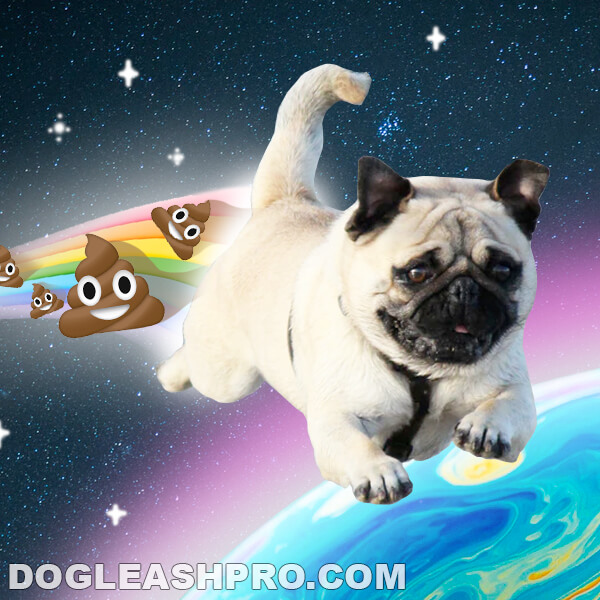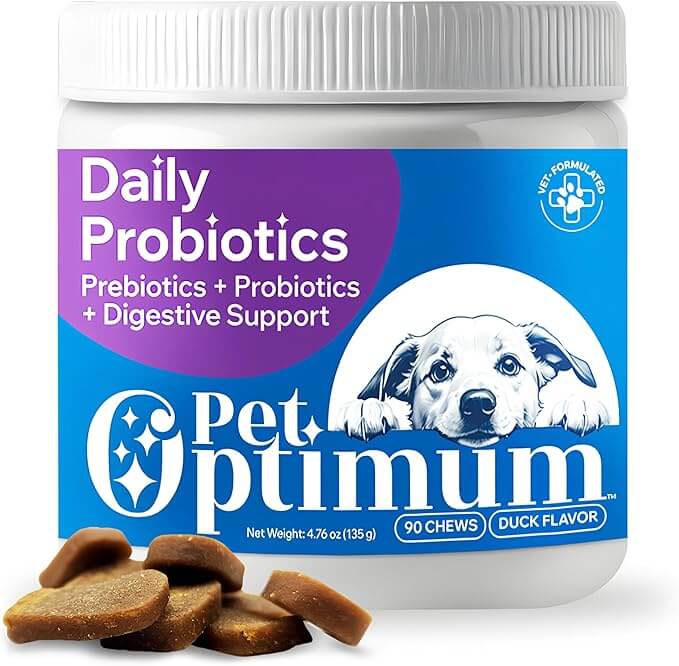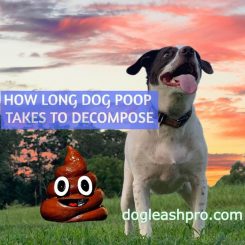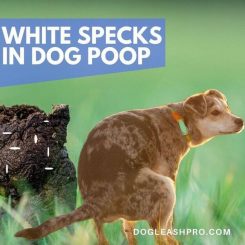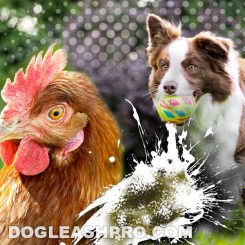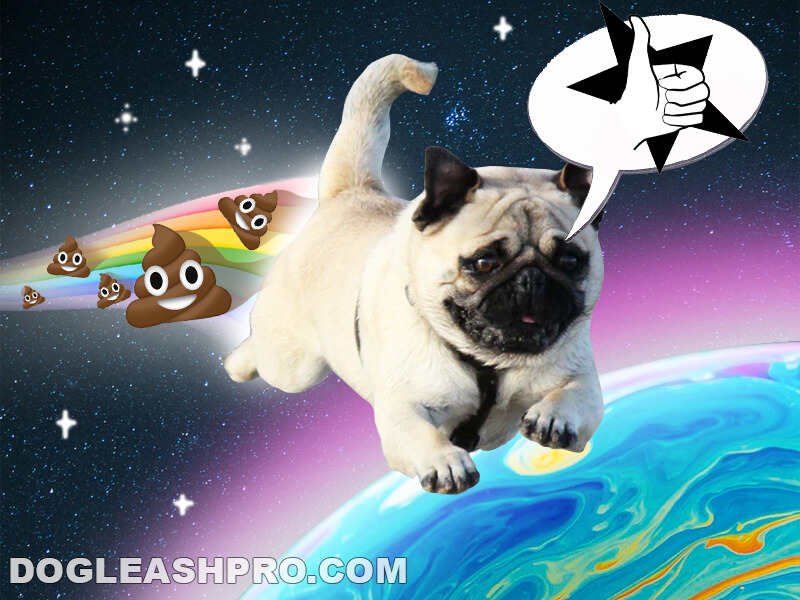
My dog has Diarrhea but is acting fine, should I be concerned? Not knowing the reason behind your dog’s loose liquid poop can give any dog owner anxiety. But as with most canine ailments, knowing is half the battle.
As an owner of two dogs, I was concerned when my Labrador puppy had diarrhea but was still playful years ago. Recently, my adult Chihuahua dog had diarrhea but was acting fine. Both of these incidents inspired me to write this article.
Keep reading to know all about this common doggy illness and when you should be concerned.
Table of Contents
What to do if my dog has Diarrhea but acting normal?
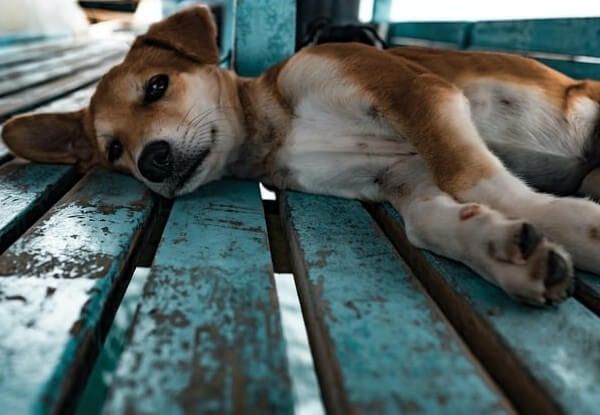
Some owners think, “My dog has diarrhea but is acting normal,” and take the situation lightly. But diarrhea can be a symptom of more severe ailments. If your furry friend is acting normal, he has possibly gotten used to an illness he has had for a while.
Dog has bloody Diarrhea but acting normal, is this normal?
You don’t always have to panic if you notice that your dog has diarrhea with blood but acts fine. The reason why your dog has bloody diarrhea but is acting fine can be a cut in the colon or large intestine. However, if you notice excessive blood in your dog’s runny poop, you should call the vet as soon as you can. This health condition requires immediate medical attention.
Dog has yellow Diarrhea but acts fine?
A bland diet of boiled chicken and rice is the go-to food for a dog with diarrhea. Both these ingredients are white, and they may turn your dog’s diarrhea yellow.
Dog has green Diarrhea but acts fine?
Green diarrhea can be due to eating an excessive amount of veggies, but it can also mean a gall bladder or an organ issue.
Dog has dark Diarrhea but acts fine?
Dark diarrhea is when an injury or ulcer is adding blood to the food during digestion. This dark-colored stool is also called Melena.
You may be interested in: Coprophagia In Dogs | Shockingly Simple Solutions & Treatments
Is your dog suffering from chronic or acute Diarrhea?
Acute diarrhea has less severity compared to chronic diarrhea. Usually, when your dog has chronic diarrhea but acts fine, it’s because he has gotten so used to the disease that he doesn’t behave any differently.
Acute and chronic diarrhea have distinct symptoms and severity. Let’s see how they differ.
The difference between Acute and Chronic Diarrhea
Acute diarrhea happens without any warning. The reason for it is something that directly disturbs the doggy’s gut. Acute diarrhea is common and can clear up in a day or two on its own.
Chronic diarrhea is a side effect of some other medical condition. To fix chronic diarrhea in dogs, you have to treat the underlying disease first.
Is it Diarrhea or loose stool?
Loose stools are an isolated incident. It is common for your four-legged friends to have a soft poop now and then.
Diarrhea is when your pooch experiences multiple loose stools consecutively. It can be soft and mushy or explosive.
Dog has explosive Diarrhea but acts fine?
My dog has explosive diarrhea but is acting fine. Why is that? Well, the reason behind explosive diarrhea is an infection in the small intestine. Explosive diarrhea is uncontrollable and messy. Plus, it can dehydrate your dog pretty quickly.
Handy Hint: If your dog is not feeling well and won’t eat, here’s How to Get Your Dog to Eat When Sick.
Dog has watery Diarrhea but acts fine?

Watery diarrhea is a severe condition that needs close monitoring. Excessive fluid loss poses a severe threat in this case, and constant hydration is crucial.
Dog has Diarrhea for 3 days but acting normal?
Consider visiting the vet if your dog has diarrhea for 3 days but acts fine. However, if your dog’s poop shows any improvement, he may be on track to recovery.
Dog has Diarrhea for 4 days but acting normal?
Diarrhea lasting four days means your dog is suffering from an underlying medical condition, as food-related diarrhea clears up in a day or two.
Dog Diarrhea symptoms
- Watery stool.
- Frequent pooping.
- Excessive poop.
- Lethargy.
- Dehydration.
- Fever.
- Anorexia.
- Bloody poop.
- Mucus in poop.
- Discolored poop.
- Straining to defecate.
- Weight loss.
- Stomach rumbling.
- Listlessness.
- Loss of bowel control.
Small intestine Diarrhea in dogs
The distinction between small and large intestine diarrhea is crucial as both conditions have different causes, symptoms, and treatments.
Small intestine diarrhea makes the dog visibly weak and lethargic. Your K9 friend won’t act fine, and his poop will be discolored but not bloody. Things are opposite in the case of large intestine diarrhea.
20 Common causes of Diarrhea in dogs
There are various reasons for diarrhea in dogs—both acute and chronic. Let’s overview them briefly.
Acute diarrhea causes
1. Overeating
Overeating puts an excessive workload on the dog’s digestive system, causing stomach pain and diarrhea.
Not only that, overeating can cause over nutrition. This means weight gain as well as tummy swelling, abdominal pain or discomfort, and even loose stools or diarrhea. If you overfeed your dogs, their digestive system is on overload. The dog’s digestive system stops being efficient and instead is causing indigestion.
2. Contaminated food
Frequently consuming moldy or rotten food can give the dog a bad case of the runs. Always serve your dog fresh food.
Our open and exposed garbage can is like a buffet for our dogs. The food could be rotten or spoiled and our furry family members will still attempt to eat it. These spoiled food contain bacteria that can cause upset stomachs in dogs and lead to diarrhea. Diarrhea is a way for the dog’s body to get rid of poisonous or rotten food.
3. Food allergies
Food that is otherwise safe to eat can also cause your dog digestive distress. It happens when your dog is allergic to that food. If your pooch is lactose intolerant, avoid feeding them dairy products.
Our canine family members can also be allergic to wheat products, grain products, or even soy products.
4. Poisoning
Common human foods like chocolate, onion, garlic, raisins, and grapes can poison and cause diarrhea in dogs.
If you know certain food are poisonous to dogs, keep them on high surfaces or counters and make sure your dogs can’t reach them.
This also includes plants around the house that are poisonous to dogs such as the Hostas plant. Be sure to keep such plants in areas where your dog can’t jump up and sneak a bite or be near them.
5. Human food
Frequently feeding your dog human foods high in fats, salt, and sugar can cause diarrhea.
Avoid feeding your dogs processed food as well. Processed food contains preservatives and additives to keep the food fresh and have a longer shelf life. Unfortunately, it is unhealthy for dogs, and eating highly processed food can cause diarrhea in dogs.
Opt to make dog-friendly meals or treats yourself at home instead.
6. Dietary change
A sudden change in your furry friend’s diet can shock his digestive system, making it work incorrectly.
7. Medicine side effects
Some medicines and drugs come with side effects which include diarrhea.
8.Virus
A viral infection like Parvo, canine coronavirus, or distemper can attack your furry friend’s digestive system and this can lead to diarrhea.
RELATED: Can A Dog Get Parvo Twice?
9. Bacteria
When the bad bacteria in the doggy gut outnumber the good bacteria, it leads to gastrointestinal distress as well as diarrhea.
Handy Hint: You’ll want to get probiotics for dogs if the bad bacteria in their gut is greater than the good bacteria. Yakult is packed full of probiotics and good bacteria. Check out Can Dogs Drink Yakult? to find out if this sweet drink is safe for dogs.
10. Intestinal blockage
Food wrappers, candy wrappers, large pits, bones, toys, socks, and other indigestible items can cause intestinal obstruction in dogs, leading to painful diarrhea.
11. Internal injury
A sharp object such as a bone shard, fishbone, or wood can damage the intestines and lead to bloody diarrhea.
You may be interested in: Can Dogs Eat Fish Heads?
12. Exposure to toxins
Continued exposure to contaminated water or food with harmful substances can give the dog a bad case of diarrhea.
Chronic diarrhea causes
13. Parasites
Intestinal parasites can cause small and large intestine diarrhea in dogs. Its indication is white dots or worms in the dog’s feces.
14. Stress
A drastic change in routine or anxiety can send dogs into stress, affecting their normal bowel function.
15. Ulcers
Stomach and intestinal ulcers can cause severe gastrointestinal upset and diarrhea in dogs.
16. Bowel diseases
Inflammatory bowel disease is a collection of stomach conditions that cause diarrhea and inflammation of the dog’s intestines.
17. Vascular dysfunction
A blood clot that prevents blood circulation to the dog’s intestines can mess with a dog’s gastrointestinal function and cause diarrhea.
18. Injury
An accident, severe injury, or trauma to the dog’s gastrointestinal tract can cause bloody or dark diarrhea.
19. Liver disease
Liver diseases like ulcers, inflammation, cancer, and complete liver failure are often accompanied by diarrhea.
20. Kidney disease
Kidney diseases occur from toxicity, injury, cancer, or old age. They also trigger diarrhea.
Why does my dog have Diarrhea at night?
The primary reason for nocturnal diarrhea in dogs is stress. It could be mental stress or stress from a sudden change in diet. Other reasons include parasites and food allergies.
Should I exercise my dog if my dog has Diarrhea?
No, you should not exercise your dog if he or she has diarrhea. It’s best to take a break from strenuous activities and give your pooch some time to rest to recover his gut health.
Dog has Diarrhea but acting normal and eating: What if I can’t find a cause?
If my dog is eating but has diarrhea, but I can’t find a cause, the only thing I’d do is take him to the vet. However, there are certain things you can consider to give you some idea.
Dog has Diarrhea but still eating and drinking: 4 Things to consider
If your dog has diarrhea but is eating and drinking normally, try checking these four things.
1. Duration
Common acute diarrhea usually clears up in a day or two. But if your canine family member has had diarrhea for longer, he may have chronic diarrhea.
2. Poop color
If your furry friend’s diarrhea is green, grey, black, or red instead of chocolatey brown, there may be an underlying condition.
3. Presence of foreign objects
Plastic bits, parasite eggs, or squiggling worms indicate a parasite infestation or foreign object ingestion.
4. Additional symptoms
If you notice your pooch showing lethargy, fever, or dehydration, it’s time to see the vet.
You may be interested in: How Long Does It Take For Dog Poop To Decompose?
6 Possible medical issues that can cause Diarrhea in dogs
1. Inflammation
Inflammation of the colon, pancreas, large bowel or intestinal lining makes the stool loose and watery.
2. Infection
Several viruses, parasites, and bacteria can attack your dog’s gastrointestinal tract and make him excrete diarrhea repeatedly.
3. Injury
If a dog gets injured, the trauma can cause internal bleeding and injury to the gastrointestinal tract. Ingesting a poison or caustic chemical can also trigger diarrhea in dogs.
4. Metabolic dysfunction
Hyperthyroidism, Addison’s disease, kidney failure, hepatitis, and Exocrine Pancreatic Insufficiency are leading causes of diarrhea in dogs.
5. Autoimmune diseases
Inflammatory bowel disease is an immune disorder commonly behind bouts of diarrhea in dogs.
6. Organ disease
Old age, cancer, toxicity, trauma, or congenital disorders often cause organ diseases, and diarrhea is one of their symptoms.
Dog has loose stool but acting normal: When should I start worrying?
Continuous or prolonged bouts of diarrhea require immediate veterinary attention—especially if your pooch is tiny or weak. Also, be on the lookout for odd-colored or bloody poop, hunched posture, lethargy, and disorientation.
At-home remedies if your dog has Diarrhea
You can treat doggy diarrhea yourself if your canine friend is in good health and has no underlying medical issues. After consulting with a vet, here are ten things dog owners can do at home.
1. Fasting
Dogs suffering from gastrointestinal distress will benefit after their digestive system gets a 12 to 24-hour rest via fasting.
2. Infrequent meals
After the initial fast, reduce the feeding frequency and increase the time between each meal to give your four-legged friend’s stomach some time to rest.
3. Bland food
Put your dog on a plain diet of boiled white rice and boneless chicken. Add his usual dog food little by little as his condition improves.
4. Food with starch
Starchy foods like Butternut Squash, sweet potato, boiled potato, and white rice help make the poop more firm.
5. Fibrous diet
Fibrous foods like pumpkins and special fiber supplements can help recover normal gastrointestinal function in dogs.
6. Probiotics
Probiotics are healthy bacteria that keep the dog’s gut health in check. Fermented foods like kefir, yogurt, and cottage cheese carry these beneficial gut bacteria naturally.
However, many dog owners prefer the convenience and consistency of supplements specifically designed for pets. That’s where PetOptimum Probiotics for Dogs comes in—vet-formulated to provide the right balance of live cultures and prebiotics for optimal digestive health and immune support.
7. Prebiotics
Prebiotics supports the growth of good bacteria in the doggy gut. While there are numerous natural sources of prebiotics, you can also get them in specially designed dog food.
8. Hydration
Keeping your dog’s water level up is crucial during diarrhea. You can also add an electrolytic solution to the water to help recover the lost electrolytes.
9. Anti-diarrheal medicines
Some human anti-diarrhea medicines can work on dogs too. Flagyl and Tylan are two over-the-counter medications you can use on dogs with your vet’s approval. Be sure to consult with your vet first.
10. Dewormers
If your dog has intestinal parasites, your vet may prescribe dewormers for you to administer at home. Once the parasites are gone, your dog will recover its gastrointestinal function.
Here is a deworming treatment for canines that’s highly recommended by our vets.
When to see the veterinarian?
Prolonged and excessive diarrhea that lasts for more than two days is a cause for concern and requires medical treatment. You should also check with the vet if your dog’s behavior changes and starts showing other symptoms. Lastly, any odd coloration, worms, or blood in the poop is a red flag.
When can dog Diarrhea lead to emergency care?
When doggy diarrhea has caused severe dehydration, and your dog cannot drink water, they may require emergency care. Another cause for an emergency would be diarrhea caused by acute organ failure or any other severe medical condition.
Dog Diarrhea Do’s
1. Inform the vet
Whether it seems mild or severe, the first thing to do is to inform your dog’s vet. Any home treatment must have their approval first.
2. Fast
A 12 to 24 hour fast can rest your dog’s digestive system and aid recovery.
3. Isolate
Parasites and infections can transmit to other dogs. Make sure to isolate the affected dog to contain the spread.
4. Check for dehydration
Dehydration is a lingering threat when your dog is suffering from diarrhea. Give your furry friend plenty of water and electrolytes.
Dog Diarrhea Don’ts
1. Hold water
When fasting your dog, continue giving him water. Your dog will lose plenty of fluids with his runny stools and dehydration will make things worse.
2. Administer medicines yourself
Don’t administer medicine—even the over-the-counter ones—without your vet’s approval. Ask your vet first before administering any medicine to your pooch.
3. Feed the same diet
If your dog has diarrhea, you should switch to a plain boiled, unseasoned white rice and chicken diet.
4. Wait too long
After your dog comes down with diarrhea, you shouldn’t wait any longer than three days before taking him or her to the vet.
5. Leave the dog unsupervised
An unsupervised dog would be free to eat unhealthy food, which would worsen his condition.
6. Ignore severe symptoms
Be on the lookout for other symptoms, as they can tell a lot about the reason for your dog’s diarrhea.
Related Questions
Normal behavior usually accompanies large intestine diarrhea. It can also mean a chronic illness that your dog has gotten used to.
Switch to a plain diet of boiled rice and chicken. As the dog’s condition improves, gradually and slowly return to regular food.
Your dog likely ate something that disturbed his or her digestive system. Fasting your dog and putting it on a bland diet should make his diarrhea go away.
Diarrhea should not last more than 2 to 3 days. Any longer than that should prompt you to go to the vet.
DISCLAIMER: THIS WEBSITE DOES NOT PROVIDE MEDICAL ADVICE
The information, including but not limited to, text, graphics, images and other material contained on this website are for informational purposes only. No material on this site is intended to be a substitute for professional veterinary advice, diagnosis, or treatment. Always seek the advice of your veterinarian or other qualified health care provider with any questions you may have regarding a medical condition.
Resources:
https://www.ncbi.nlm.nih.gov/pmc/articles/PMC5508351/
https://journals.plos.org/plosone/article?id=10.1371/journal.pone.0051907

With over five years of specialized experience as an animal writer, my expertise lies in dog nutrition, health, behavior, grooming, and training. I am dedicated to delivering helpful and informative content that caters to the well-being of our furry friends. My primary goal is to empower pet owners with knowledge and ensure our canine companions thrive in health and happiness. In my free time, I love volunteering at local dog rescue centers.
